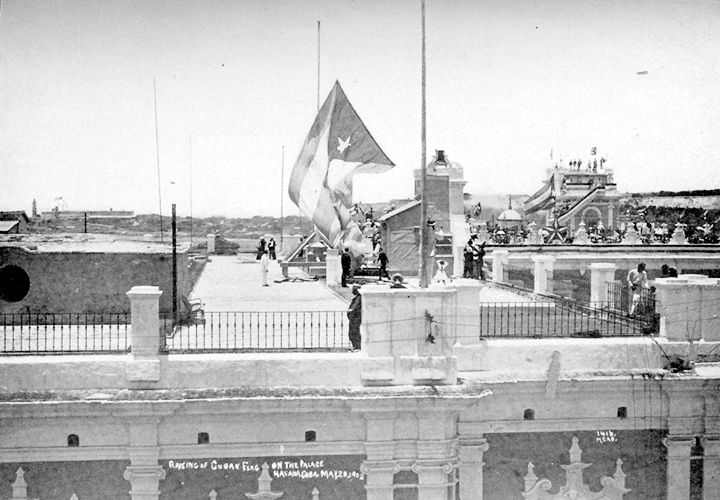
1902 The Republic was proclaimed and U.S. intervention ended.
1903 U.S.-Cuban Treaty signed whereby the United States obtained Guantanamo base.
1905 President Estrada Palma obtained a second term by defeating liberal candidate Jose Miguel Gomez.
1906 Guerrita de Agosto, a Liberal Party uprising, hastened U.S. intervention.
1906-09 Second U.S. intervention.
1908 Liberal candidate Jose Miguel Gomez won election to a four-year term.
1912 Short-lived racial uprising led by the Agrupación Independiente de Color. Conservative Mario G. Menocal was elected to a four-year term.
1917 Cuba declared war on Germany. Short-lived uprising in Oriente and Camagüey led by the Liberal Party.
1920 Collapse of the sugar boom. Liberal Alfredo Zayas won election to a four-year term.
1923 U.S. representative Enoch Crowder sent to Cuba to “reform” political process.
1924 Gerardo Machado elected to his first four-year presidential term. Shor-lived revolt by the Association of Veterans and Patriots.
1925 Gerardo Machado assumed the presidency. Cuba Communist party was founded.
1927 The anti-Machado Directorio Estudiantil Universitario was founded.
1929 Machado was “reelected” to a new six-year term.
1930 The U.S. Hawlley-Smoot Tariff Act reduced the Cuban share of the U.S. market. Mass student and popular demonstrations against the Machado regime occurred. The Clandestine ABC organization was established.
1931 Carlos Mendieta and former president Mario G. Menocal organized a short-lived uprising in Pinar del Río. Carlos Hevia and Sergio Carbó’s expedition from the U.S. was crushed by the Machado army.
1933 U.S. became involved in mediating between Machado and various groups seeking to overthrow his government. Machado was ousted and Carlos Manuel de Céspedes became provisional present. Revolt of the Sergeants led by Fulgencio Batista hastened the fall of Céspedes. Dr. Ramón Grau San Martín became present of a revolutionary government.
1934 Batista overthrew Grau’s regime and appointed Mendieta as provisional president. Platt Amendment was abrogated. Partido Revolucionario Cubano (Auténtico) organized.
1935 A general strike forced the resignation of President Mendieta, who was replaced by Jose A. Barnet.
1936 Miguel Mariano Gómez “elected” president. Federico Laredo Brú became president.
1939 Grau San Martín elected president of the Constitutional Assembly. The Confederacion Nacional Obrera, created in 1925, is reorganized into the Confederacion de Trabajadores de Cuba (CTC).
1940 Constitution was drafted. Batista elected president for a four-year term.
1942 Cuba declared war on the Axis powers.
1944 Communists changed their party name to Partido Socialista Popular. Dr. Ramon Grau San Martín elected president.
1947 Eduardo Chibás formed the Partido del Pueblo Cubano (Ortodoxo). Cayo Confite expedition against Dominican dictator Rafael L. Trujillo was thwarted by the Cuban government.
1948 Fidel Castro participated in the “Bogotazo” in Colombia. Carlos Prío Socarrás elected president.
1951 Eduardo Chibás committed suicide.
1952 Batista seized power through a military coup.
1953 Resistance organized and led primarily by Auténticos and university students. Castro launched the ill-fated Moncada attack.
1954 Batista “reelected” president for a four-year term.
1955 Attempt at political compromise organized by Sociedad de Amigos de la República failed.
1956 Montecristi conspiracy within the military squashed by Batista. Auténticos attacked unsuccessfully the Goicuría army barracks. Castro’s Granma expedition landed in Oriente province.
1957 Members of the Directorio and the Auténticos attacked unsuccessfully the Presidential Palace. Directorio leader José Antonio Echeverría killed by police. Strike paralyzed almost all the western provinces of the island. Castro consolidated his guerrilla operations in the Sierra Maestra.
1958 Castro-organized general strike collapsed. Castro expanded guerrilla operations into Las Villas province. Military offensive against the guerrillas failed. U.S. gradually withdrew support for the Batista regime. Rigged election produced the victory of Batista’s candidate, Andrés Rivero Agüero. Increased demoralization and corruption led to the gradual collapse of Cuba’s armed forces. Batista and his close associates escaped to the Dominican Republic.








